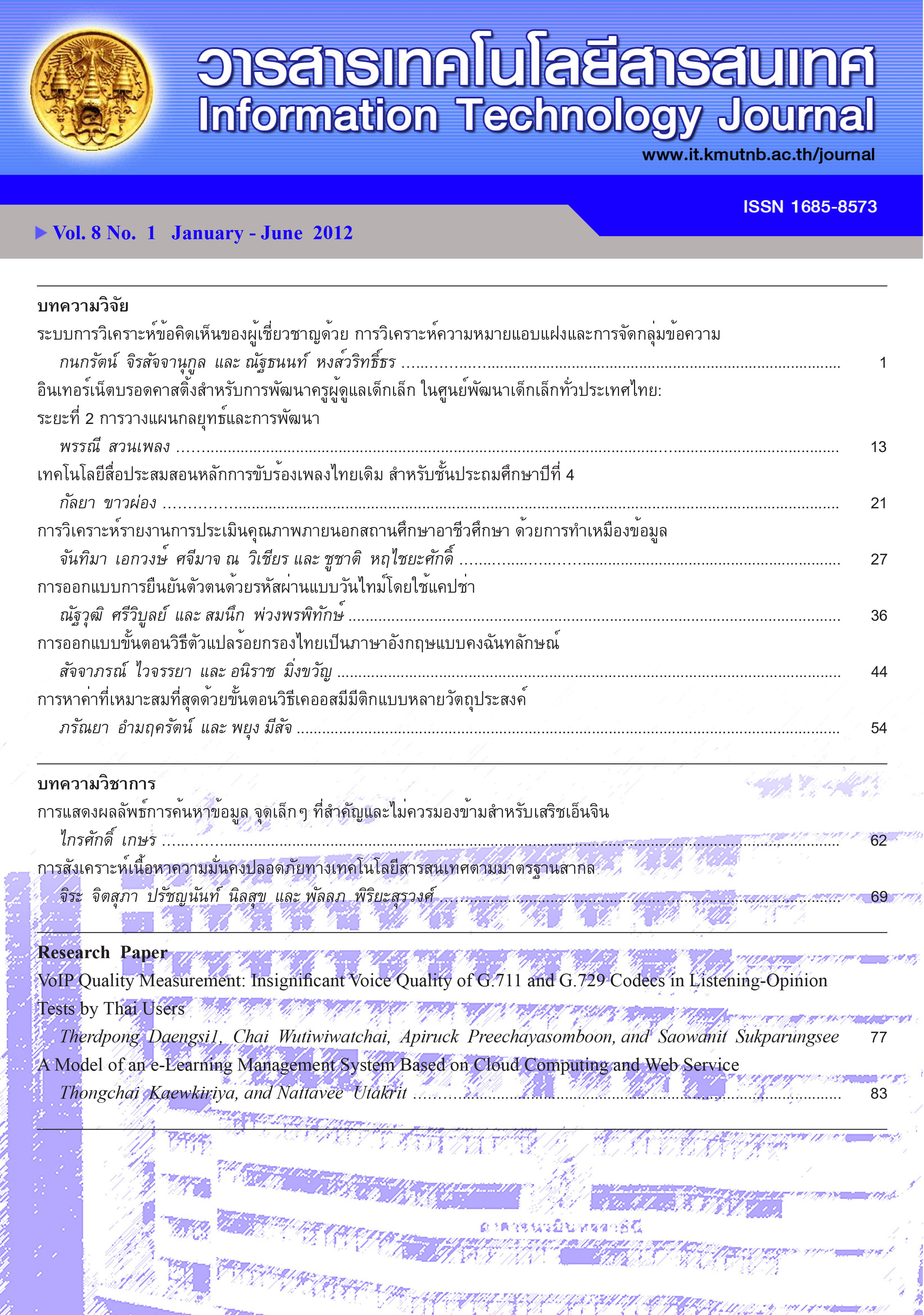ระบบการวิเคราะห์ข้อคิดเห็นของผู้เชี่ยวชาญด้วยการวิเคราะห์ความหมายแอบแฝงและการจัดกลุ่มข้อความ
Main Article Content
Abstract
งานวิจัยนี้มีวัตถุประสงค์เพื่อศึกษาและพัฒนาระบบ การวิเคราะห์ข้อคิดเห็นของผู้เชี่ยวชาญด้วยการวิเคราะห์ความหมายแอบแฝงและการจัดกลุ่มข้อความ สำหรับช่วยเหลือผู้ทำวิจัยด้วยเทคนิคเดลฟาย เพื่อช่วยลดเวลาในการวิเคราะห์ข้อคิดเห็น ลดความคลาดเคลื่อนหรืออคติที่อาจเกิดขึ้น ทั้งนี้ได้ประเมินคุณภาพของระบบ โดยการประเมินผลด้านความพึงพอใจของผู้ใช้ที่มีต่อระบบจากกลุ่มผู้ประเมิน จำนวน 37 คน เป็นผู้ที่เคยดำเนินการวิจัยด้วยเทคนิคเดลฟาย จำนวน 15 คน และไม่เคยดำเนินการวิจัยด้วยเทคนิคเดลฟาย จำนวน 22 คน ผลการประเมินของผู้ประเมินทั้งหมด พบว่าความพึงพอใจโดยรวมที่มีต่อระบบอยู่ในเกณฑ์ดี ( x = 3.99) ประโยชน์ที่ได้รับจากระบบ คือ ช่วยลดปัญหาเรื่องอคติความลำเอียง หรือการขาดความรอบคอบในการวิเคราะห์ได้ ( x = 4.14) ช่วยลดเวลาในการวิเคราะห์ข้อคิดเห็น ( x = 4.05) และหากผู้ประเมินมีการเก็บข้อมูลลักษณะคำถามปลายเปิดจะกลับมาใช้ระบบนี้ช่วยในการวิเคราะห์ข้อคิดเห็น ( x = 4.00) โดยผลลัพธ์ที่ได้จากระบบสามารถนำไปใช้งานได้ ( x = 3.53) นอกจากนี้ คะแนนความพึงพอใจที่มีต่อระบบโดยรวมของผู้ประเมินทั้งสองกลุ่มแตกต่างกันอย่างมีนัยสำคัญทางสถิติ ชี้ให้เห็นว่า ระบบที่พัฒนาขึ้นในงานวิจัยนี้ มีรูปแบบการใช้งานและให้ผลการวิเคราะห์จัดกลุ่มข้อคิดเห็นถูกต้องเหมาะสมเป็นไปตามหลักการของการวิจัยด้วยเทคนิคเดลฟาย สามารถนำไปใช้งานได้จริง เนื่องจากผู้ประเมินที่เคยดำเนินการวิจัยด้วยเทคนิคเดลฟายมีระดับคะแนนความพึงพอใจสูงกว่าผู้ที่ไม่เคยดำเนินการวิจัยด้วยเทคนิคเดลฟาย
Analyze System of Expert’s Opinions using Latent Semantic Analysis and Text Clustering Technique
Kanokrat Jirasatjanukul and Nuttanont Hongwarittorn
This research aimed to develop experts’ opinions analysis system using Latent Semantic Analysis (LSA) and text clustering techniques as a tool to help Delphi Technique researchers, in order to reduce the time required to analyze answers, decrease lost questionnaires, lower expenses for the collection of questionnaires for each phase, and reduce errors or bias which may occur during the analysis of the answers. The researcher evaluated scores for satisfaction with the use of the system. 37 evaluators divided into two groups comprised of 15 people who have done research using the Delphi Technique and 22 people who have not done research using the Delphi Technique. Evaluation results show indicate that the satisfaction is excellent ( x = 3.99). The system can reduce biases or mistakes in the analysis ( x = 4.14), time consuming in the analysis ( x = 4.05). The system provides benefits for the analysis when the survey is conducted by using open-ended questions ( x = 4.00). The results from the system are practical ( x = 3.53). Moreover, both groups’ scores of satisfaction with the system in general was different at the statistical significance. This indicates that the system developed in this research, comprising use models and opinions clustering analysis research results are appropriate and consistent with the principles of Delphi technique research. This system can be used because evaluators who used the Delphi technique before had higher satisfaction scores than evaluators who had not previously used the Delphi technique.


